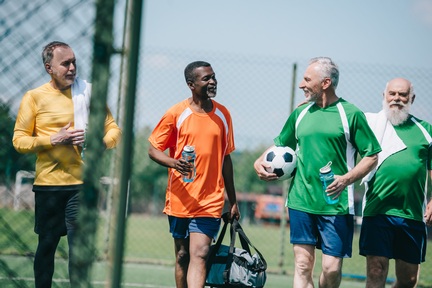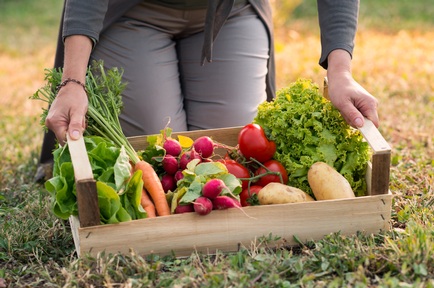Coronavirus: £5m given for social prescribing activities like football
The UK government will give £5m for social prescribing activities like football and art to limit loneliness and boost mental health during the COVID-19 pandemic.

The money will go towards community activities including football, art projects for people with dementia as well as efforts to improve green spaces and offer people debt advice.
The National Academy for Social Prescribing (NASP) has been awarded £5 million and will work with the Arts Council England, Natural England, Money and Pensions Service, NHS Charities Together and Sport England to deliver local activities.
2,000 men helped already by 'game changer' football
The Academy, launched last October to promote social prescribing, is part of the NHS approach to improve a person’s health and wellbeing by recognising health is is affected by social, economic and environmental factors.
The Academy will fund Newcastle United Foundation ‘Be a Game Changer’ programme which has already helped over 2,000 men, who traditionally avoid NHS services but may have been impacted by COVID-19 and are most at risk of suicide.
The Foundation’s ‘12th Man’ programme helps men with mental health issues by letting football fans talk about their mental health, get involved in walking football, engage in support groups and get lifestyle advice. Social prescribing link workers in GP practices will refer fans to the scheme.
Steve Beharall, Newcastle United Foundation said: “Working with the Academy and social prescribing link workers will enable us to reach more people, to help communities recover from COVID. We’ll be sharing our ‘Game Changer’ learning with other football clubs, to support men’s mental health.” Money will also go to Art by Post, which was set up during lockdown. The Southbank Centre has been sending free creative activity booklets to people across the UK who are living with dementia and other chronic health conditions. So far more than 1,800 people across the UK have taken part.
Alexandra Brierley, director of Creative Learning at the Southbank Centre, said working with social prescribing link workers “enables us to connect with the people who are most isolated by the current social distancing measures, and it’s been a privilege to see the artworks and poems that the participants have shared with us.
"We can’t wait to share these unique creations which will form a special exhibition at the Southbank Centre when we reopen.”
Singing and breathing project aids COVID-19 survivors
The English National Opera is working with Imperial College Healthcare NHS Trust to create a six-week programme of singing and breathing to help the recovery of COVID-19 survivors. The Trust says this is vital for those who are suffering from breathlessness and the anxiety associated with it. The funding will also enable people to benefit from debt advice from the Money and Pensions Service (MPS).
Caroline Siarkiewicz, chief executive of the MPS, said: “Financial, physical and mental health are all deeply connected. We’re looking forward to working with NASP, to ensure that social prescribing link workers can connect people to local money advice and guidance services, to improve financial wellbeing as a core part of COVID support.”

The Academy's funding will connect people to local wildlife by encouraging bee keeping, food growing, healthy cooking and environmental art and crafts.
Grozone in Northwich, Cheshire is a two-acre community wildlife therapy project that helps people of all disabilities. More than 1,500 people have been helped by activities like healthy cooking, gardening, environmental art and crafts, music workshops, and beekeeping.
With improving green spaces also on the Academy’s agenda, Marian Spain, chief executive of Natural England said: “COVID-19 has highlighted the importance for people to have easy access to high quality greenspace close to where they live for their mental health and wellbeing.
"So, I’m absolutely delighted that Natural England are working with the National Academy to help people connect with nature."
Health minister, Jo Churchill said: “This new funding is hugely important, as it will allow us to build on the merits of social prescribing and encourage innovation in local projects, as well as supporting people to remain connected with their local community, reduce loneliness and improve their wellbeing.
“GPs and social prescribing link workers have been working incredibly hard to support their patients through this challenging time. As we begin to support the move out of lockdown, social prescribing will be key to tackling health inequalities and helping people recover and rebuild their lives.”
Latest News
 29-Jul-24
Dementia Bus gives carehome.co.uk staff insight into life with dementia
29-Jul-24
Dementia Bus gives carehome.co.uk staff insight into life with dementia
 27-Jul-23
UK's top home care agencies in 2023 revealed
27-Jul-23
UK's top home care agencies in 2023 revealed
 30-Nov-22
A quarter of older people keep their falls secret from family
30-Nov-22
A quarter of older people keep their falls secret from family
 29-Nov-22
'Covid-19 has not gone away' say terminally ill
29-Nov-22
'Covid-19 has not gone away' say terminally ill
 28-Nov-22
IT consultant who received poor care opens 'compassionate' home care business
28-Nov-22
IT consultant who received poor care opens 'compassionate' home care business